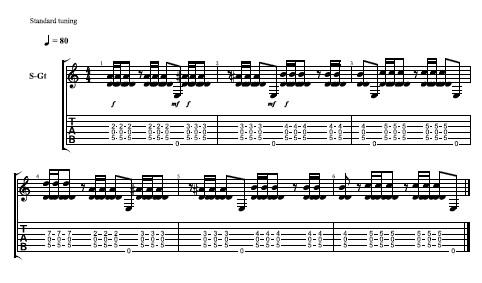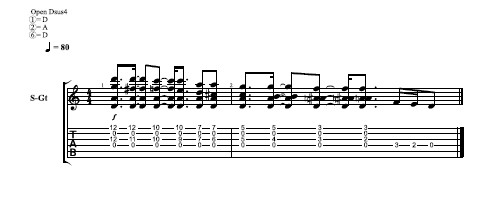How to Play Kashmir
Today, we’re going to go over on how to play “Kashmir” by Led Zeppelin. This riff is super cool, very fun to play and also in a very interesting tuning! The tuning for this song is often referred to as Led Zeppelin tuning, or even wider known as “DAD-GAD” tuning. This name is very helpful because…DAD GAD is 6 letters total and actually spells the tuning out for you. Unlike standard tuning which is E, A, D, G, B, E when looking from the 6th string down. DAD GAD is also a Dsus open chord tuning. The strings become D, A, D, G, A, D just as we were saying earlier, it spells itself out, also going 6th string down to first. So only 3 strings are actually lowered from standard tuning. The 6th string is dropped a whole step from E to D, The 2nd string is also dropped a whole step from B to A, and of course the 6th and 1st string are the same, so the high E, the first string is also dropped down a whole step to D.


Step 1: The Main Riff
So in learning how to play “Kashmir” on the guitar, we use some pretty interesting shapes. For our first shape I place my pointer on the 3rd string 2nd fret and my pink on the 5th string 5th fret and an open 4th string. The open 4th string will stay constant in all the chords for this part.
We’re in the Key of D Major and also pedaling on the D string, the 6th string open. We strum down, up, down, then slap to mute. To mute I kind of karate chop my guitar, meaning I use my palm to hit all the strings over the pickups to silence them. You can also mute using your fretting hand to touch all the strings on the neck at once. The very best way to mute is to do both at once! This guarantees silence and makes you look like a pro.
Spend some time practicing this to get in the habit of doing it and to make your muting techniques tight. I also encourage my students to practice to get fast at turning their volume knob off. This will separate you quickly from others and make you sound like a pro. Nothing sounds sloppier than letting a guitar ring out forever after you’re done with your riff or lick. You can also mute with your fingers. Sometimes we do it by accident and that’s the sound we want, but we want it to be done intentionally.
After we play this chord shape down, up, down, and mute, we then do it again but after the last down I’m going to hit the open 6th string to get that low D ringing out. This takes us right into our next chord, where all we do is move our pointer in one fret. So it’s now on the 3rd fret 3rd string. We moved our pointer from the 2nd fret to the 3rd.
Then we’re going to keep bringing it in. So now it is on the 4th fret 3rd string. Doing that same strum pattern twice but the second time ending on an open D on all of these. Now we’re going to move out of position. We’re still going to hold down the 5th string 5th fret but now we are replacing our pinky with our pointer and move our ring finger to the 7th fret 3rd string. This transition can be a little tricky so try to isolate it and spend a lot of time going back and forth between your pinky on the 5th fret 5th string to your pointer.
For this part we only do the strum pattern instead of the normal two, then go back straight to our first shape without playing an open low D on the 6th string in between these two shapes. If you are enjoying learning how to play this riff, be sure to check out our lesson how to play Jimmy Page style guitar chords for even more interestng Jimmy Page style chord voicings.
Step 2: The Descending High Chords
For part two we are way higher up on the neck and all we’re doing is switching between two different shapes. We are however switching the frets, but the shape pattern stays the same. For shape 1 we have our pointer on the 3rd string and our middle finger on the 1st, they will both be inside the same fret for this shape. For the second shape we move our pointer down a fret on the same string, so they’re still on the same strings, but now one is in the fret before the other instead of being together in the same fret.
We start both fingers in the 12th fret and strum from the 4th string down once, then you’re going to move your pointer finger down a fret but keeping your 3rd finger on the 12th fret 1st string and your pointer will be on the 11th fret 3rd string. So for all of these we strum from the 4th string down, giving us an open 4th string and an open 2nd for all the shapes.
Then we’re going to move both fingers into the 10th fret with our pointer on the 3rd string and our ring finger on the 1st, then move our pointer down a fret so pointer on the 9th fret, 3rd string and ring fingers staying on the 10th fret 1st string. Then both fingers in the 7th fret with a single strum and then pointer down a fret to the 6th fret 3rd string and keeping our ring finger on the 7th fret 1st string. Then both fingers inside the 5th fret and strum, and of course pointer down a fret to the 4th fret 3rd string with your ring finger still on the 1st string 5th fret. For our last shape we move both fingers to the 3rd fret, strum once and then move our pointer to the 2nd fret, keeping your ring finger on the 1st string 3rd fret and end with a lick! Everything on the 4th string for this lick, and it’s very simple. All we do is pick the 3rd fret, the 2nd fret and the open string, all on the 4th string.
Recap: How to Play Kashmir
I hope you enjoyed learning how to play “Kashmir” on the guitar! Remember to change your guitar to the DADGAD tuning or this song will definitely not sound right. While you have your guitar in that tuning you should mess around with it and see what you come up with. Sometimes a new tuning can spark creativity since all the things you normally do will sound completely different. The most important thing about the song is to keep those fingers arched on these unusual shapes and make sure you are allowing the notes you want to ring out to ring out.


